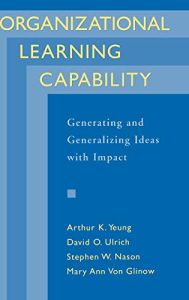Join getAbstract to access the summary!

Join getAbstract to access the summary!
Arthur K. Yeung, David O. Ulrich, Stephen W. Nason and Mary Ann Von Glinow
Organizational Learning Capability
Generating and Generalizing Ideas with Impact
Oxford UP, 1999
What's inside?
Organizational learning is more than just your employees picking up new skills — It’s your company’s ability to acquire and share knowledge, and the willingness to do something with it.
Recommendation
Drawing the reader’s attention with ample real-business examples, the authors discuss corporations as entities that must adapt, generate ideas and act upon new information. The writing team – Arthur K. Yeung, David O. Ulrich, Stephen W. Nason and Mary Ann Von Glinow – delve into learning styles, basing their work on research and material gleaned from a widespread survey of corporations and organizations. They stack up the building blocks necessary for organizational learning, the corporate ability to generate and implement ideas. Although based on scholarly research, the book is concisely written in an easily accessible, conversational tone, and comes to life with corporate case studies. getAbstract recommends this book to managers, executives and owners whose organizations might need to learn a thing or two.
Summary
About the Authors
Arthur K. Yeung is Executive Director (Asia-Pacific) of the University of Michigan Business School, where he teaches and conducts research in leadership and organizational capabilities of Asian multinational corporations. David O. Ulrich is a professor in the School of Business at the University of Michigan in Ann Arbor. Stephen W. Nason Stephen W. Nason Mary Ann Von Glinow is professor of management and international business in the College of Business at Florida International University. She was the 1994-95 President of the Academy of Management.

















Comment on this summary